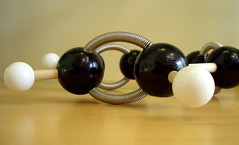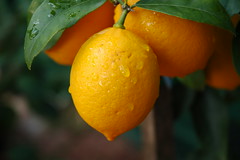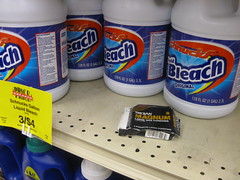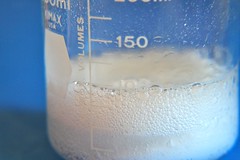Biology: Chapter 2 - Chemistry of Life Flashcards
Terms : Hide Images [1]
| 2722700979 | atom | smallest basic unit of matter. |  | 0 |
| 2722700980 | element | substance made of only one type of atom that cannot be broken down by chemical means. |  | 1 |
| 2722701099 | compound | substance made of atoms of different elements that are bonded together in a particular ratio. |  | 2 |
| 2722701100 | ion | atom that has gained or lost one or more electrons. |  | 3 |
| 2722701144 | ionic bond | chemical bond formed through the electrical force between oppositely charged ions. |  | 4 |
| 2722701145 | covalent bond | chemical bond formed when two atoms share one or more pairs of electrons. |  | 5 |
| 2722701334 | molecule | two or more atoms held together by covalent bonds; not necessarily a compound. |  | 6 |
| 2722701787 | hydrogen bond | attraction between a slightly positive hydrogen atom and a slightly negative atom. |  | 7 |
| 2722701788 | cohesion | attraction between molecules of the same substance. |  | 8 |
| 2722701789 | adhesion | attraction between molecules of different substances. |  | 9 |
| 2722701929 | solution | mixture hat is consistent throughout; also called a homogeneous mixture. |  | 10 |
| 2722701930 | solvent | substance in which solutes dissolve and that is present in greatest concentration in a solution. |  | 11 |
| 2722701994 | solute | substance that dissolves in a solvent and is present at a lower concentration than the solvent. |  | 12 |
| 2722701995 | acid | compound that donates a proton (H+) when dissolved in a solution. |  | 13 |
| 2722701996 | base | compound that accepts a proton (H+) when dissolved in solution. |  | 14 |
| 2722702056 | pH | measurement of acidity; related to free hydrogen ion concentration in solution. |  | 15 |
| 2722702057 | monomer | molecular subunit of a polymer. |  | 16 |
| 2722702058 | polymer | large, carbon-based molecule formed by monomers. |  | 17 |
| 2722702300 | carbohydrate | molecule composed of carbon, hydrogen, and oxygen; includes sugars and starches. |  | 18 |
| 2722702301 | lipid | nonpolar molecule composed of carbon, hydrogen, and oxygen; includes fats and oils. |  | 19 |
| 2722702302 | fatty acid | hydrocarbon chain often bonded to glycerol in a lipid. |  | 20 |
| 2722702405 | protein | polymer composed of amino acids linked by peptide bonds; folds into a particular structure depending on bonds between amino acids. |  | 21 |
| 2722702406 | amino acid | molecule that makes up proteins; composed of carbon, hydrogen, oxygen, nitrogen, and sometimes sulfur. |  | 22 |
| 2722702567 | nucleic acid | polymer of nucleotides; the genetic material of organisms. |  | 23 |
| 2722702568 | chemical reaction | process by which substances change into different substances through the breaking and forming of chemical bonds. |  | 24 |
| 2722702653 | reactant | substance that is changed by a chemical reaction. |  | 25 |
| 2722702654 | product | substance formed by a chemical reaction. |  | 26 |
| 2722702788 | bond energy | amount of energy needed to break a bond between two particular atoms; or the amount of energy released when a bond forms between two particular atoms. |  | 27 |
| 2722702789 | equilibrium | condition in which reactants and products of a chemical reaction are formed at the same rate. |  | 28 |
| 2722702879 | activation energy | energy input necessary to initiate a chemical reaction. |  | 29 |
| 2722702880 | exothermic | chemical reaction that yields a net release of energy in the form of heat. |  | 30 |
| 2722703132 | endothermic | chemical reaction that requires a net input of energy. |  | 31 |
| 2722703133 | catalyst | substance that decreases activation energy and increases reaction rate in a chemical reaction. |  | 32 |
| 2722703487 | enzyme | protein that catalyzes chemical reactions for organisms. |  | 33 |
| 2722703694 | substrate | reactant in chemical reaction upon which an enzyme acts. |  | 34 |
